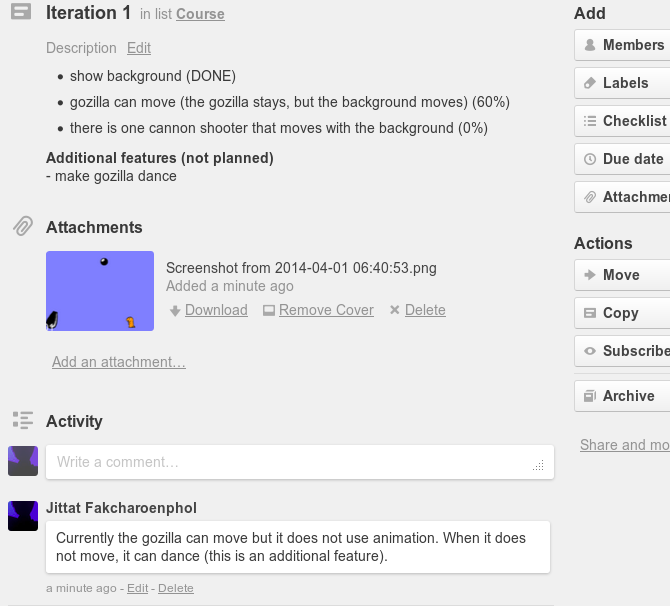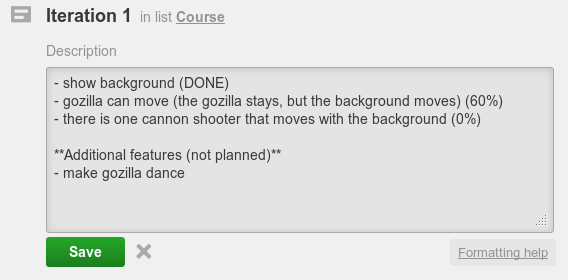ผลต่างระหว่างรุ่นของ "01219245/iteration review"
Jittat (คุย | มีส่วนร่วม) |
Jittat (คุย | มีส่วนร่วม) |
||
| (ไม่แสดง 4 รุ่นระหว่างกลางโดยผู้ใช้คนเดียวกัน) | |||
| แถว 40: | แถว 40: | ||
Good: ...........(list the things that you like about the project; what are the things you think that the owner has done well in this iteration)....................... | Good: ...........(list the things that you like about the project; what are the things you think that the owner has done well in this iteration)....................... | ||
| + | |||
Try: ...........(list the things that can be improved, give suggestions on what the owner should try in the next iteration)............. | Try: ...........(list the things that can be improved, give suggestions on what the owner should try in the next iteration)............. | ||
| + | |||
| + | For example: | ||
| + | |||
| + | Good: the current gameplay is very interesting. | ||
| + | |||
| + | Try: get at least one working scenario with only one enemy in the next iteration, | ||
| + | so that you can get feedback on the gameplay. | ||
=== Code quality review === | === Code quality review === | ||
| + | We will do a quick code review for "obvious" code quality standards. For this review, we will not work in a large group, but in a pair of 2 people. | ||
| + | |||
| + | * Form a pair with another student (not necessarily in the same group from the previous feature review). | ||
| + | * One student starts as a reviewer. | ||
| + | * Use the following form: [http://theory.cpe.ku.ac.th/wiki/images/01219245-code-review-form1.pdf code-review-form1.pdf] (I'll hand a paper form out in class) | ||
| + | * Work on the code owner's machine: | ||
| + | ** Let the reviewer look at a few source files to give a review on the overall coding style. | ||
| + | ** Let the reviewer pick two interesting functions and look at the code of each function. The reviewer can ask questions to the code owner. | ||
| + | ** The reviewer should give review comments on the form. The reviewer should also talk with the code owner while giving the review comments. | ||
| + | * Switch the role. | ||
| + | |||
| + | Also, put every javascript code into [http://jshint.com/ JSHint], and record important comments from it. | ||
| + | |||
| + | === Self evaluation === | ||
| + | |||
| + | Finally, give yourself a score, out of 10, for this iteration, considering: | ||
| + | |||
| + | * the progress that you have made | ||
| + | * the quality of the game | ||
| + | * the quality of the code | ||
| + | * how much you learn from implementing this iteration | ||
รุ่นแก้ไขปัจจุบันเมื่อ 08:56, 2 เมษายน 2557
- This is part of 01219245
เนื้อหา
Preparation
Write your own review in your Trello board
Update the card for the first iteration.
- In the list of features/tasks, put a note after each item regarding if you have completed this feature/task and, in case you haven't finished it, how much you have completed (approximately).
- If you have implemented something you have not planned, add another list for these addition features/tasks.
- Add a few screen shots to the iteration card.
See example below.
For text formating, you can use Markdown format. See quick reference for Markdown here. See an example below.
Push your code to your Git repository at Github/Bitbucket
Your friends will get your software by cloning your code from your repository. So don't forget to push your code there. If you have big media files (e.g., some sounds/images which are larger than, maybe, ten megabytes), you should avoid pushing those files to the repository, though. In this case, you can discuss with me how to host these files.
If you change your Git repository, don't forget to update the link on your Trello board.
Iteration review
We will review the project features and the quality of the code.
Project features
In your Trello board, create a new card called Iteration 1 comments in the Course list. Invite your friends in your group to your board. (You can remove them later after the review.) You friend will put comments related to your project features and project quality (not related to the code) there.
This is how we shall proceed:
- Start with a project from one member of the group.
- Make sure everyone has this member's project installed.
- This member tells other people about the current iteration and let the other members play her/his game.
- The members of the group can talk freely, the project owner can clarify various issues from the other members.
- When everyone has tried the software to see most of the features up to one's satisfaction, everyone should write comments on the Iteration 1 comments card of the project owner. The comments should be in a form like this:
Good: ...........(list the things that you like about the project; what are the things you think that the owner has done well in this iteration)....................... Try: ...........(list the things that can be improved, give suggestions on what the owner should try in the next iteration).............
For example:
Good: the current gameplay is very interesting. Try: get at least one working scenario with only one enemy in the next iteration, so that you can get feedback on the gameplay.
Code quality review
We will do a quick code review for "obvious" code quality standards. For this review, we will not work in a large group, but in a pair of 2 people.
- Form a pair with another student (not necessarily in the same group from the previous feature review).
- One student starts as a reviewer.
- Use the following form: code-review-form1.pdf (I'll hand a paper form out in class)
- Work on the code owner's machine:
- Let the reviewer look at a few source files to give a review on the overall coding style.
- Let the reviewer pick two interesting functions and look at the code of each function. The reviewer can ask questions to the code owner.
- The reviewer should give review comments on the form. The reviewer should also talk with the code owner while giving the review comments.
- Switch the role.
Also, put every javascript code into JSHint, and record important comments from it.
Self evaluation
Finally, give yourself a score, out of 10, for this iteration, considering:
- the progress that you have made
- the quality of the game
- the quality of the code
- how much you learn from implementing this iteration

